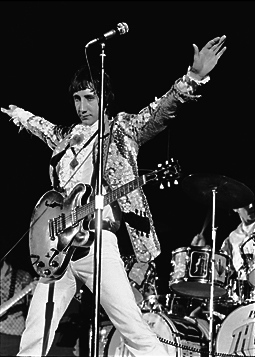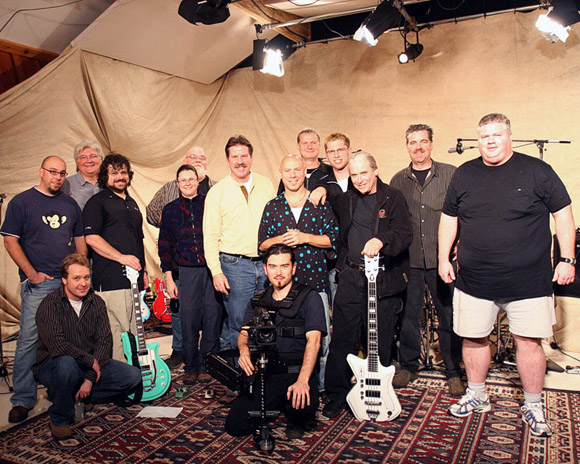The days, weeks, months, and years of shedding and learning your craft are behind you. You are a guitar player, capable of making a living at this noble craft, but now what? Here is what, I think, are some tasks that will take you to the next level.

Pete Townshend (The Who)
#1. Being seen.
There are several ways to go when getting your name out there. Many musicians think it’s a good idea to move to a big city and play gigs for no money just to be “seen”. In my estimation, through years of experience, this is a total waste of time and effort. Take it from me, if you think your talent is worth not being paid for, it’s a guarantee no one will either. Being a good guitar player in a live setting is a good idea to showcase your skills, but if a guitar player plays well in the forest and nobody hears him (her)… well you get the idea.
My solution to this scenario is to fine tune your skills, find a high profile band and get the gig playing in that band. How do you do this? Take a page out of Keith Moon’s book. Walk right up to the bandleader during a break and introduce yourself. Shake hands, compliment the band and quickly present your card. At that point, you say “if you ever need a guitar player please give me a call I think I can do a good job for you.” Do your research and meet as many bandleaders as you can until you get the gig you want. I can tell you that bandleaders are always on the lookout for players, always! And if they don’t need one at that moment they soon might or might know someone else who does. There is no such thing as a wasted contact.
When I say high profile, I mean a cover band with a full schedule of well paying gigs. But if it is an original band you seek, this will be harder, but not impossible. Remember, you must prepare yourself for other then musical parameters to get the gig. Stuff like image fit and age specifics. Be real and reasonable. These days image is 90% of what original bands look for when filling positions. You may even have to switch over to a more “video friendly” axe. Also, a good tip for auditioning for an original band is to have songwriting ideas on your guitar. This is where a guitar education comes into play. If the songwriter has a three chord formula going, your alternative voicing on your guitar will quickly enamor you to the band and its producer.
#2. The Demo.
Oh yes, the old demo, the most underrated tool for gig attainment. I cannot tell you how many musicians I have auditioned in the past 5 years who do not have a decent/relative demo. You would think in the age of affordable digital home studios some one out there would be focused enough to have a relevant demo for a gig they are applying for. I recently ran an ad for a friend who owns a piano bar looking for an entertainer. The ad specifically said “piano player/singer.” I cannot tell you how many responses I got from solo piano players and from singers who did not play piano, and from people who sent demos without singing on them. Be focused enough to send a demo that is appropriate. Why in God’s name would I hire a guitar player for an R&B gig if his demo is a country demo. That to me means he’s trying to stretch or did not feel the R&’B enough to include it on the demo. No dice!
#3. Be professional.
I have alluded to this in other columns, but it bears repeating and in a bit more depth.
My motto is ABP, Always Be Playing. Study, study, study, take as many lessons as you can afford in as many types of music as you can. I believe that a classical guitar lesson will probably not transform you to becoming the next “maestro” but some classical ideas, or fingerings may make their way into your style. This will help you get a signature sound and feel. That is a very marketable commodity in the cookie cutter world of guitar players. Same can be said for country or jazz guitar disciplines, as they all add to the gumbo of what is to be “you.” Aside from your gear this is what you bring to every gig you do, and is a lot more valuable.
I played with a guy years ago named Lou Korosi from Glen Cove, NY who could play some mean jazz on his Telecaster as well as play rock, reggae and fusion. And Lou could move seamlessly from one to another. His rig was a Tele w/a bumbucker in front, a Twin Reverb and a MXR Phase 90. That’s it.
Once you get your gig, show up on time, with dependable, appropriate gear. Be prepared and relaxed. Remember you are a guitar player! A most noble of trades.
Now get to work!

Eastwood Guitars & Friends

Establish a “persona’ and seperating your skills and what you have to offer (singing, stage presence , Unique look ect. and stick too it. Take every gig you can to show yourself and even learn new styles and how to play with bad musicians.It is important to show that you can play without problems. Dont complain about anything, unless you dont get paid. Using this method early in my career has led to world travel, and playing with some amazing people. Think of yourself as a spouse, one that is attractive, with no baggage. Gigging is not not hard, just make yourself a good product. Remember always that no matter how good you play, you must entertain also. Finally, there is a difference between a confident, valuable player, and an egotistical primodonna:)